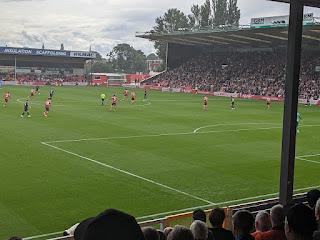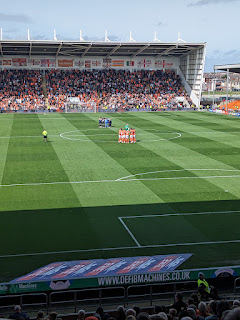I've not written anything about football in more general terms for ages. I miss doing that. I think maybe it's because, like all 'content providers' (a term that makes me want to bounce my own face off a solid object until I can feel nothing anymore) I've become trapped in a loop of my own making. I try not to follow the numbers and tell myself I'm beyond that shallow thinking... but it becomes a kind of inevitable mild mental illness. It makes you feel good to get reinforcement - you chuck this shit into the universe and it's nice when a small part of it reacts. Without meaning to, you end up subconsciously doing more of the same. Pieces about CJ Hamilton cast as a comedy character in a film where a lovable but hapless fella accidentally becomes a professional footballer get more responses than pieces about the socio-economic trends of society being reflected in football. Hence, you get more pieces with ever more elaborate descriptions of CJ not quite pulling off the moment of genius we all secretly are hoping he will and less about say, Radcliffe Borough's importance as beacon of local identity.
Anyway...
I read a piece today that really made me think and prompted me to write something in a different tone than I've done for ages.
That's what I like about fan writing (another term that knocks me a bit ill to be honest) - sometimes you come across stuff that yer actual media (Gary Neville, Henry Winter and that) can't say. They're not and never will be, cognisant of the experience of fandom because, they'll never understand how it feels to waste loads of money and time on a thing that makes you profoundly unhappy sometimes. Football may make them unhappy, but it also provides them a living and they've got an inherently
different relationship that, whilst not at all disqualifying them from comment on players, tactics, managers etc, does make it a bit hard to take them seriously when they talk about fans and football culture.
I've never put ads on this or asked for donations or owt, partly because I'd probably get about 8p a month and it would be pointless, but also because I really don't want the thing I genuinely really like doing (going to games and then talking a bit of shit about it) to become something where I have to start 'looking for an angle to sustain the numbers' or even worse 'doing because I have to' - that's the fundamental difference between me and Henry Winter or whoever. I don't have to do this. It's not my job. I can write, say and do what I want (or not) - that's where sometimes, I think fans* can write some insightful stuff - because they're free to just do whatever.
(*in general, not me in particular, though I do think my groundbreaking piece about the Fonz ringing someone's nan has been overlooked by the literary world unfairly)
The piece I read is here:
https://www.afcbpodcast.com/opinion/the-dark-side-of-football-fandom/
What it made me think is below:
Firstly, the notion that as Blackpool fans, we're somehow a unusually 'toxic' fanbase, I don't think holds true. I think we are a bit mental compared to some and frankly, that's no bad thing, but in terms of hyperbolic tendencies, probably no more prone to them than anyone else.
I heard on the way back from Lincoln, an Arsenal fan literally screaming into his phone on Talksport because Arteta has played a player out of position. Words like 'clueless, disgrace, stupid' thrown like septic water gushing from a particular fetid tap. The article is about Bournemouth - a club that have 'punched above their weight' for a while and we often look at with some envy - yet, there's a really negative undertone to it all. These are clubs who have had good experiences of late. Outperformed expectation in the top league!
We think 'oh, if we were actually up there, it would be fun, not angry' - but would it? I think the world has turned, even since the last time we got there.
Would it not be an amplification of all the rage and anger. Would it not be even more desperate when we're doing badly? Even harder to shake off a defeat, because the noise that surrounds it is even louder?
I'm not suggesting at all that we all just give up on wanting success - that would basically defeat the whole point for following any team in the professional game - but I'm questioning the idea that actually, 'toxicity' (such as it is) is unique to particular clubs and is banished forever by success.
'Fans just want success' is a cliche' that the professional voices often trot out. It was a stick used by ignorant voices during our own fights with our owners (yes Mark 'Clem' Clemmit, you, you fucking prick) and there's no doubt a grain of truth to it - it's rare to see a club embroiled in crisis whilst winning a quadruple. It's only a grain of truth though as what we see in the twitter comments and hear in the phone in voices, is often a level of rage about the temporary absence of success that is quite irrational. Liverpool fans fury as outlined in the article is a bizarre phenomena.
I'm not suggesting that top flight club's fans don't have things to be discontented about - but in general, the things I would empathise with them over such as the touristification (I made the word up) of their grounds, the relentless kick off changes, the increasing prices and the general ever growing distance between clubs and the communities they were birthed by and are sited in aren't really the kind of things that gain traction on the spaces where fans' views are heard and seen. The fact you've not won the Champions League EVERY season doesn't seem to be that much of a burden to carry.
It's part of the global aspect of football. The 'armchair' supporter of the 80s and 90s was part of how the biggest clubs built their power base financially. Football fans would mock the Slough based Manchester United fan but their voice and opinions rarely reached our ears. We'd chuckle at Liverpool shirts in Surrey and look down our noses. They were 'missing out' and would never be as important as us who actually went to games. They only wanted wins. That was their literal reason to follow the team. Reflected glory. They'd never get it.
How little we knew. The income from global rights and subsequent opportunities to advertise on a global scale is now more important than the income from match going supporters by several orders of magnitude. It's more important even than domestic TV rights. Football has gone global.
With social media connecting the world, it means that it's not just the fella in a Candy shirt in St Albans in 1991 who has an opinion on Liverpool. It's people in Jakarta, Christchurch and Rio and almost everywhere beyond and in between.
Those voices massively outnumber the season ticket holders on the Kop. They outnumber even the 'plastic' glory hunters from the home counties. They're many millions in number and they're loud. If the fella from Taunton in a Man U shirt is only about glory, then that's even more true of people from further away. There's no sense of pride in place or tradition or routine. No 'I'm here cos my dad took me' or whatever the narrative we use to understand why we turn up each week. It's a raw bet on success. It's a brand relationship like any other.
If you buy a fancy car to up your street cred and it breaks down, you get angry. If you have a much loved old banger passed down to you, then you kind of accept it. This isn't a million miles away from the difference in the way the 'new breed' of fan supports their team as compared to the traditional (legacy) fan. There are of course, exceptions. There are thoughtful and objective supporters from all over the globe. Absolutely there are. I've literally talked to them. There's also lots of people who've made a kind of consumer bet on Man Utd or Chelsea or Liverpool at a particular point and are very pissed off when that bet doesn't work out.
Perhaps, it's somehow easier, when distanced from things, to glibly trot out loud opinions. Perhaps it's easier, when you don't actually see the players in the flesh, not least because they're on another continent, to forget that they're people as well as objects for critique. Maybe, if you aren't in anyway part of the 'community' of the club (in any physical sense at all) easier to not really understand the impact that relentless critique has on the atmosphere around the whole affair. Anyone who actually attends games regularly will understand that, yes, whilst we go to watch the team win (ideally) we also find some joy in the collective experience. Triumph feels good, because we're experiencing it together. Disaster is perhaps best mitigated by us sharing our frustrations and finding a black humour in the experience.
I love the notion that the article cites about the idea that a lot of the loudest internet voices and the comments that sustain them are actually just classic 'internet trolls' - that's a category that has always been around from back in the day on the web - they lurk and hype up stuff and post controversial things for responses. They're not 'football fans' first - they're internet trolls first - and perhaps they don't and maybe never have, actually gone to games.
Why are they always sat at home, in a home studio, reacting too games? It's weird! Could it be, they've just latched on to a thing where it's easy to get responses - Internet trolls will often attach themselves to bizarre places if there's good responses to be had. There's an entire internet community on a message board, dedicated to winding up the users of Mumsnet for example. It's easy fishing... Football is already quite emotive and prone to a bit of trigger happy response - so for a troll, for whom eyes on a screen actually equals income and even a career, football is a perfect platform.
If we're not convinced about the validity of that, then there's certain media figures who've built an entire career out of essentially just being angry about things they're not actually angry about on a daily or weekly basis. That's as true of football (I'm looking at several presenters of national football phone ins over the top of my glasses with a disapproving look) as it is of social and political commentators.
If we went back 30 years, the idea of anyone being interested in the view of some random fella in his bedroom being furious about what substitutes Arteta had made would be really, really weird. It would be practically incomprehensible. He's not even there?! He's not even from London?! WHY ARE WE WATCHING HIM WATCH A GAME???
Now, there's a whole shift in the way football is viewed by the world and actually, being totally disconnected from the game by geography is by far the most dominant form of spectatorship. That person has a whole audience of people for whom he is 'a voice' and 'a face' - he represents a wide range of fans and he's mad as hell and he wants them to be too because ANGER = COMMENTS and COMMENTS = CASH in a world of internet grift.
There's loads of good, constructive, creative fan media (I would say that wouldn't I?) and some great twitter accounts and interactions you can have on message boards etc but that stuff is generally a bit of an anomaly compared to the overall tone.
How much has actual yer football fandom been shaped by that? How much has the way we all behave before, during and after games been impacted by the presence in our discourse of people who aren't actually, in any traditional way at all, part of the cultural group of 'football supporters' as we'd classically understand that to be. Most clubs aren't quite in the global spotlight in the way Arsenal and Liverpool and even Bournemouth are... I think it does still have an impact.
Most of us will engage in some form of social media post match (or even during match) That becomes in some ways, the dominant way we receive our analysis - more so than the papers for certain and even a tabloid ghost written column is far, far, far, far more considered and thoughtful than 'Fuck player X cos he is a cunt and should die' type analysis. There's a huge number of posts on any given day that just say 'Player X is god' or 'Player X is shit' - It's all very binary.
You don't see many viral tweets that say 'player x has a range of strengths and perhaps today wasn't his day and maybe we should also consider a range of factors including the work of his teammates, his personal life and the inherent and inevitable fact that sometimes football goes wrong and it's not your day because if it didn't, it wouldn't actually be football at all'
We used to laugh at the cliche's like 'its a funny old game' and 'at the end of the day' but we'd recycle them ourselves in the way we thought about the game as that was the dominant kind of reflections we heard beyond our our own 'pub chat.'
Now we're recycling each others rage and amplifying our fury simply in order to be heard above the din
I personally adore Brett Ormerod as a footballer and also as a person. His in game analysis isn't always as incisively analytical or deeply data driven as it might be. There's something really quite glorious though about his go to phrase of 'It's one of them Chizz'
That annoys people sometimes, I know... but... sometimes, it IS 'one of them Chizz' - sometimes shit just happens and that's the way it is. Especially on a football pitch where the whole appeal of the game is that a load of fellas are crammed into a small space with a ball and the rules of the game are literally designed to make some 'shit happen' at regular intervals. Sometimes, that shit goes against you and it's 'one of them Chizz' - if we can't collectively accept that, then rage and fury are the only possible results from football. 'One of them' will inevitably come along sooner or later. Even if you're a Man City fan. Eventually.
I'd rather take my cue from the laid back and philosphical ex footballer with warmth in his voice and a bit of a smile in his heart than some weird raging, sweating, angry, humourless fella with a pseudo Sky Sports set up like he's living out a strange childhood fantasy of being a furious Steve Ryder. These people are weird as fuck. They chuck rage into the ether to feed rage and they make money out of it.
You and I,
we don't make any money out of anger. We just end up feeling shit. I think that's worth thinking about sometimes. The whole social algorithm is tweaked towards generating fury because fury makes money for someone somewhere. That someone isn't us.
As the article above points out there's a very real and quantifiable mental health crisis and football is a kind of boiling pot where those things can burst out. Football is not and never will be separate from society. It's an incredible thing that you can lose control at a football game. It's one of the reasons why I love it deeply. It's like nothing else.
It's perhaps not so incredible if that cathartic release of anger becomes a prolonged and repeated pattern of ever increasing frustration and rage that goes well beyond the confines of a stadium or 90 minutes.
You don't always win. It would be weird and hollow if you did. Fuck's sake Pool. Imagine never saying that again. You'd actually miss it.
Onward.















































